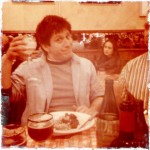Featured Poet: January 2012 Vol. 4 # 3
classid="clsid:38481807-CA0E-42D2-BF39-B33AF135CC4D" id=ieooui>
Shanan Ballam’s poetry has appeared or is forthcoming in several literary journals, including Crab Orchard Review, Main Street Rag, Indiana Review, and Cream City Review. Her chapbook, The Red Riding Hood Papers, was released by Finishing Line Press in 2010. Her poetry manuscript, Pretty Marrow, was a semi-finalist for the 2010 Brittingham and Polk Poetry Prizes, the 2010 May Swenson Award, and the 2010 Philip Levine Prize in Poetry. She teaches poetry writing and academic writing at Utah State University.
Featured Poet: December 2011 Vol. 4 # 2
classid="clsid:38481807-CA0E-42D2-BF39-B33AF135CC4D" id=ieooui>
Tim Tomlinson is a co-founder of New York Writers Workshop, and co-author of its popular text, The Portable MFA in Creative Writing. Recent work appears or is forthcoming in Asia Writes, Floorboard Review, InterlitQ, Mandala Journal, The New Poet, Prick of the Spindle, riverbabble, Pank, the New York Quarterly, and the anthology Long Island Noir (Akashic Books). His poem “Blue Surge, with Prokoviev,” in Sea Stories, has been nominated for Sundress Publications’ Best of the Net 2011.
Mescaline
On mescaline we walked close to the dunes
where terns nested. They swung into the sky
and dove like arrows aimed straight at our heads.
I wasn’t sure if it was happening,
but it was happening, and I watched you run
to the shoreline, fall knee-deep in the surf,
your arms flailing at residual trails
the terns sliced into the ether.
How odd that must have appeared to people
not on mescaline, but how intriguing
to me. Van Morrison’s intrigue of
nature’s beauty occurred to me, how there’s
stillness underneath nature’s violence
and from that stillness all things radiate.
But that’s not what you were thinking when they
pulled you soaked and shivering from the surf.
Later you explained how that one image—
me watching your terror—is what ended
us. That was the danger with mescaline:
the immutable truths it might reveal.
Morgan’s Bluff Revisited
At dawn the gulls laugh again.
Two gray angelfish ascend …
… kiss the surface …
… recede …
the water’s surface wrinkles.
Pink light separates the gray sky from the gray sea.
Enormous clouds form like the aftermath of great explosions.
How pensive this daybreak,
a grenade without a pin.
In a needling insect heat the dawn’s final breeze fades.
A jeep’s lights flash on, it backs out of the commissary.
Pelicans lift from the pylons.
The Cuban whore retreats up the Bluff Road,
her sandals dangling from a finger.
Loop Current
At sunrise we piss from the upper deck
onto the flat calm surface of Biscayne Bay.
We are eighteen, the deck is high—our piss
arcs out in glorious loops, splashes with
a bracing violence, its ripples rolling
past the breakwater into the canal
linked to Government Cut where tugs push
cruise ships toward the Gulf Stream, our piss following.
I imagine it churned up in the whitewash
of giant propellers, swirling in a blend
of seas and plasmids as it joins the world’s
great currents, hugging the Atlantic
coastline heading north past the flashpoint
of the Civil War, past New England and
Nova Scotia into the vast schools
of bluefin tuna spearing the water
columns. Ice floes threaten shipping in
the North Atlantic. It’s lunchtime in
the UK, in Spain they’re napping. What drum
beats along the coast of Senegal, what
hurricane amasses? This will be news
in Guyana, news in Jamaica where
from Lucea to Oracabessa
shutters are pulled tight. And traffic
on Route 1 backs up past Matecumbe Key.
By the time we shake off, the coffee cools
in the galley in mugs that taste of bleach,
and local birds vector south in airstreams
miles long beneath the pink and aqua sky.
No news but the weather, no desire
but for longer, and still longer days.
Construction
Saturdays were half-days, our pockets
full of Friday money. We’d roll over
to the roadhouse on Elysian Fields,
straight-claw hammers hanging from our belts.
The jukebox played “Layla”
and “I See the Want To In Your Eyes.”
Pitchers of Dixie, package of smokes,
maybe a Stewart’s sandwich from the microwave.
Coeds from UNO bent over
the pool table, denim skirts riding their thighs,
bootheels off the floorboards. I promised
myself I’d chat up one of those cowgirls.
Saturday afternoons I made lots of promises.
Winter Sunday, Firenze
In front of the stone houses, their shutters
drawn and smoke climbing from the chimneys,
the sycamores are bare, leaves loiter
at the tires of the silent cars.
Orchestral music from a radio …
a woman’s face in a second storey window …
the shops are closed. No aromas of bread
from the forna, no chatter outside the tabacchi.
At the corner, visitors follow packages
into a taxi. The taxi turns onto Viale dei Mille’s
empty lanes. You proceed to the canal,
always the canal, your hands in your pockets,
a Camus without the Gauloises.
At the Ponte alle Riffe, a grandson drops bread
to the ducks, his nonno smiling. And then
it’s just you, you and the purling water.
Featured Poet: November 2011 Vol. 4 # 1
classid="clsid:38481807-CA0E-42D2-BF39-B33AF135CC4D" id=ieooui>
Chris Mink was born and raised in Tuscaloosa, AL. He presently sweats buckets in Tallahassee while pursuing an MFA in Poetry at Florida State University. His work has appeared or is forthcoming in The Greensboro Review, The Chattahoochee Review, Anti-, The Offending Adam, and la fovea. Earlier work can be seen in a folder his mother keeps.
The Mauling of a Poet
Once I pass 13th Street and MLK, I better know somebody
or know my way out.
You’d never go there. You’re like me,
in a smoke-filled wine bar reading poems.
I take notes, wanting only to be nothing like you,
my tongue over the edges of my teeth,
how I sharpen them just now, unnoticed, the way blades
drag across rock without much effort
from the hand that holds them. Know this: on Sunday
there were Blue Nose pit bulls in the yard, and everything
on that red clay earth
was a chew toy: Tonka trucks, teddy bears, pig bone and glass, blood
dried black in the dog food. They paced the same paw path
until the trench was so deep a person could get buried.
Hookmaster and Pete brought me to the barbeque.
A red bone girl licked rib sauce from the corners of her lips.
One-sixteenth Choctaw. The rest: butterscotch dipped in cinnamon.
Pits tied to quarter-inch chains strained against their handlers, pulled back
onto their hind legs. Ears up, the dogs stared each other down,
their barrel chests swollen. I think as they did: tear of tendon, ripped
muscle, snout, neck, and every little moment of life that rises and falls
in the final pulse.
Tonight I sip my beer, pull my cigarette until my insides fill with fire.
You’re on to children now, or hotel employees, whichever one you blame
for betrayal. That horrible scarf you got for your birthday.
Oh, yes, one more story about your birthday, one more plug
for your published works, your travel, your love of cuisine,
especially from brown people. Any shade will do. I shift my chair
and remember Hookmaster’s reply when I mentioned how tough I felt
being on the wrong side of the tracks. His arms like battleship cannons,
hands that could jerk a rhino by the horn through a gopher hole.
I’ll stay in this chair
until you finish your villanelle about the trials of a writer,
or I could tell you
the weight of a pit bull’s final breath in my arms.
You better hope my chain holds.
Mr. International
On Thursday my fantasies are tall women
with lipstick like blood from a bullet wound
and toenails to match. August
isn’t even a full day old. Just through those branches,
a sky
with the orb weaver in the foreground,
and a notion that I could be
an architect:
stacking rebar, spit, and steel until
curious clouds become territorial.
Every time I see really nice luggage
in an airport I think about the swimming pool
at my apartment complex, the taller women there
burning like solar flares covered in oil.
I bet they like men that stack things.
I bet they go their entire lives staring at buildings
at the blue that backs their angles,
and it never occurs to them to see how fast
an object might fall, or how the body trembles
just before you let it go.
~these two poems originally appeared in the Chattahoochee Review
Featured Poet: October 2011 Vol. 3 # 6
classid="clsid:38481807-CA0E-42D2-BF39-B33AF135CC4D" id=ieooui>
Martina Reisz Newberry’s most recent book is What We Can't Forgive. She is also the author of Not Untrue and Not Unkind (Arabesques Press) and Running Like a Woman with Her Hair on Fire: Collected Poems (Red Hen Press). She has been included in Ascent Aspirations first anthology and has been widely published in literary magazines such as: Amelia, Bellingham Review, Blessed Are These Hands, Women's Work and others. Martina lives in Palm Springs, California with her husband Brian and their benevolent dictator/cat, Gato.
classid="clsid:38481807-CA0E-42D2-BF39-B33AF135CC4D" id=ieooui>
classid="clsid:38481807-CA0E-42D2-BF39-B33AF135CC4D" id=ieooui>
classid="clsid:38481807-CA0E-42D2-BF39-B33AF135CC4D" id=ieooui>
classid="clsid:38481807-CA0E-42D2-BF39-B33AF135CC4D" id=ieooui>
classid="clsid:38481807-CA0E-42D2-BF39-B33AF135CC4D" id=ieooui>
1. PRAISE
Say prayers where it is dark, unfathomed, unworthy.
Whisper them in a quiet, desperate voice
as if—instead of God—you were talking to a scientifically-
tuned stranger.
Say the prayer of the gap-toothed man
who touched the stripper’s shoe, knowing—if caught—
the bouncer would have him shaking blood from his hair like
a dog emerging from a lake.
In any case, that would be the prayer to say. It will not,
cannot keep you from dying,
but may give you enough time
to stop cringing, perhaps change direction, change the color of your body,
learn to give off some kind of light the way animals do,
the way birds do when they check under each wing then
praise, full-voiced, their ability to fly through the great skies.
2. PAINTING OF HIGH TEA WITH ONGOING
MELANCHOLY
This is the day a woman wakes
with a stone for a heart. She awakes
in silence or to birdsong but her
chest houses a stone and she is
mystified by this. She drinks her tea,
she sniffs the air, turns on the TV.
Her stone sits so heavily inside her
that it makes her shoulders slump. Soon she
surrenders, weeps, bends double, begins
to taste gravel, to vomit sand.
3. PHILOSOPHY
The bald man at the reading told me
“You’re not particularly
Existential are you?”
I stuttered, I guess not.
But the truth is I am. I do
all the things the other Existentialists do:
I write, slip on icy sidewalks, get lost on
the freeway, watch porno movies,
spill mustard on my blouses,
sit in bird shit on park benches, bang my
head on cupboard doors, burn my tongue on hot
soup, weep into the space where wind blows through.
Maybe he couldn’t see it, but I’m as
Existential as the next guy.
4. OTOŇIO (AUTUMN)
A woman walks west on Hollywood Boulevard.
She wears flat shoes, baggy jeans. She is full of terror and longing.
She tries to remember her last good dream, but all she recalls
is her recurrent nightmare:
the one in which her belongings are lost and she can’t find
her clothes to put
on to go find it. In the nightmare, she ventures out anyway,
holding a small
hand towel in front of her naked body. The fear in this
nightmare is enough
to keep her honest.
This woman is a loner. She loves museums, hates travel.
Sometimes she stops for a coffee and when a siren wails past,
she wonders why her children cannot love her and why
her new skin
cream isn’t working and why a well-crafted, correctly
metered line will not save or even comfort
the belittlement of age
or the failure of mythos.
5. SLEEPING GODDESS
December 2008: Martha Crawford “Sunny” von Bulow died after 28
years in the coma her husband once was alleged to have caused with
insulin injections.
Who said lies are ugly? That’s bullshit.
I have embraced one thousand lovely lies.
The unlit rooms in my head keep them safe
so that, when I do turn a flashlight beam
on them, they are in pristine condition.
No cracked canvasses here, no soft mold.
The radio always on in this room—
music, news, midnight talk shows.
I live and will continue to live
In my lies—my buttered, beautiful lies:
What was done to me
What was done for me
What was not done at all
What was fractured
What was healed
What was offered
What was eaten
What was worn
What was taken off
What was said
What was left unsaid
What washed over me during lovemaking
What I washed off after fucking
What was discovered through the looking glass
What ascended
What fell
What splintered
What did I wish for
What did I vote for
What did I conceive
What grieved me
Which goddess have I served—Danu or
The Sleeping Lady of Malta
And in serving,
what have I forgiven
classid="clsid:38481807-CA0E-42D2-BF39-B33AF135CC4D" id=ieooui>




